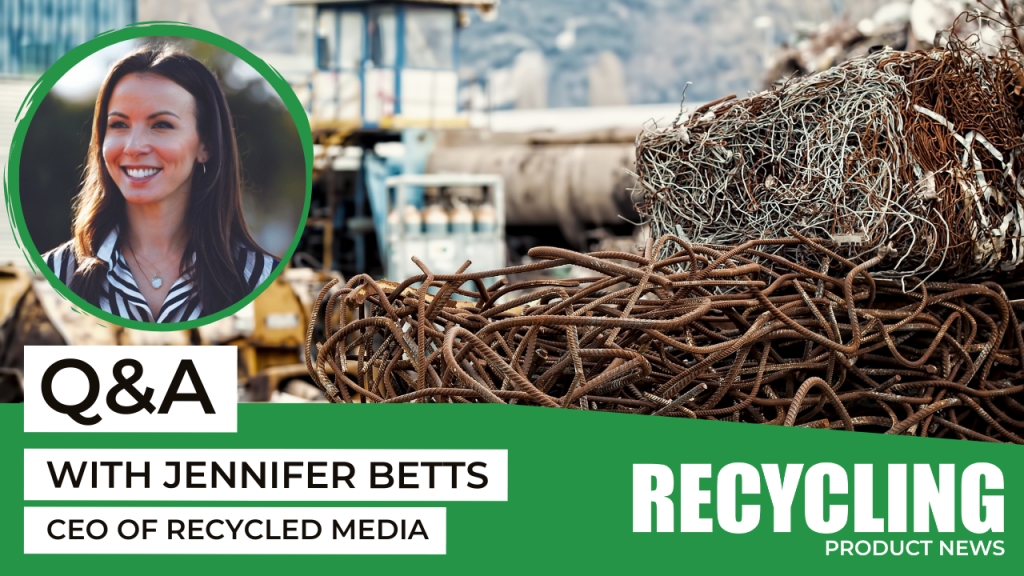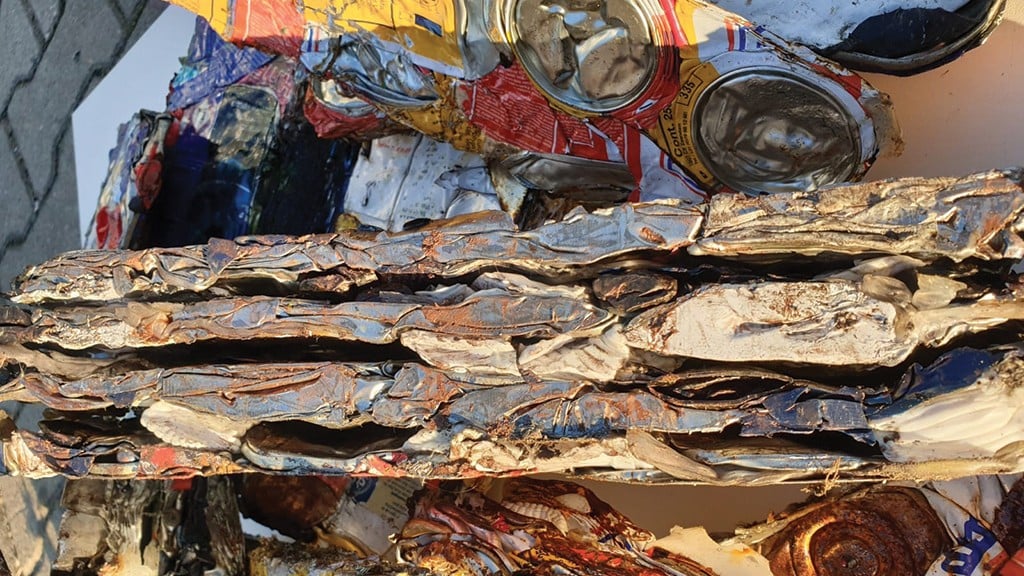Q&A: Diversity, social media, and labour retention in the metals industry

As the recycling industry continues to grapple with an ongoing labour shortage, attracting and retaining talent is more vital than ever. This is especially true as more of the current workforce nears retirement, and younger qualified workers become harder to find. To combat this, many companies are beginning to overhaul their approach to hiring by leveraging social media as a business tool, rather than just a communication platform, to reach a younger demographic.
I spoke with Jennifer Betts, CEO of Recycled Media, to discuss how her company is helping metals companies expand their audience, attract new talent, increase public awareness of the industry through social media, and more.
Slone Fox: Can you talk a bit about what Recycled Media does?
Jennifer Betts: Recycled Media is committed to supporting metal companies in expanding their audience, markets, and business streams while minimizing their carbon footprint. We offer a range of essential services, including promoting sustainable and efficient business practices that reduce the industry's environmental impact, attracting new and experienced talent to the metals industry, and using modern media channels to enhance public awareness of this industry's fascinating products and processes. Recycled Media strongly advocates for metals recycling and recognizes the positive impact it can have on both the environment and economy. Ultimately, Recycled Media is devoted to fostering the curiosity and enthusiasm of the next generation toward the metals industry while promoting a sustainable future.
SF: In your opinion, what steps still need to be taken to attract and retain a younger demographic to the metals recycling industry?
JB: To attract and retain a younger demographic to the industry, it is imperative to move outside of your comfort zone and take new actions when a different outcome is desired. Every business and person in this industry should be using their voice on platforms both on and outside of LinkedIn and traditional media channels. Gen Z and Alpha are incredibly sophisticated online and not always on the previously dominant channels.
Our industry aligns with the hopes, dreams, and frustrations of these generations. We are the front line to climate change and saving our planet's resources, yet historically we shy away from highlighting the everyday impacts of our work to the public. Get on YouTube, TikTok, Instagram, etc., and showcase the incredible work your business is doing to contribute to the environment and economy. Many folks - especially in the younger generations - are unaware that their passion for the environment can be a lucrative career path. Show them.
SF: What advice do you have for someone trying to get into the industry?
JB: The metals industry is local and global. You will always find an opportunity in this industry. Metals recycling has been around for centuries and its importance in our economy will exponentially grow in the coming decades, so think long-term. Your first position will not be your last. Many companies start new employees on the ground floor before promoting them to the next level, so find a company with leaders willing to teach new folks and listen to new ideas.
Utilize traditional channels like Google and LinkedIn to find companies within this industry.
However, take it to the next level and search YouTube, TikTok, Instagram, etc. to find the unicorns in our industry who are thinking outside the box. Direct message them. Be proactive and reach out to individuals at the company and highlight the value you bring to the table.
SF: As someone who has become quite prolific on social media, can you talk a bit about what role these platforms are playing not only as a business development tool, but as a way of attracting workers to the industry?
JB: As Bob Dylan once sang, "The times they are a-changin'." Businesses and individuals who do not embrace being uncomfortable will not grow with the times. Social media can be uncomfortable, yet it's an incredible business development tool. The various platforms offer unique opportunities to engage with potential clients, build a brand, and create educational communities for the industry.
Each platform offers different features and audiences - similar to the three main learning styles for folks (visual, auditory, and kinesthetic). At the time of this article, TikTok has 150 million Americans on its platform, and yet the majority of metal recycling companies are not on it. That's half of the United States' population, and most of our industry is missing that audience by not making it accessible.
Not a fan of TikTok? YouTube has over 2 billion active users globally, and is owned by the search engine Google. Seventy-five percent of videos played on YouTube are on mobile devices. YouTube Shorts receive 15 billion views daily, and 70 percent are longer than 15 seconds.
How do we expect to reach the next generation and promote our industry if we do not go to where the people are? Get out into your facility, take videos, explain your unique factors, and put them online. Our industry is truly fascinating and is changing the world for the better. Show the world our passion.
SF: Can you touch on your involvement with Chief and the role that it's playing in increasing diversity within the industry?
JB: Throughout my tenure in this industry, the diversity has not been an accurate representation of our domestic civilian society. Many of the companies I have worked for and conducted business with were limited in their diversity - hiring familiar faces and backgrounds as the status quo. Slowly, this is changing.
Chief has been a refreshing experience coming from a male-dominated industry. Meeting diverse female executives from other industries has been motivating and inspiring. The Chief organization has been vocal on social media channels like LinkedIn to highlight the work that needs to be done to reach equitable conditions for all. Seeing other female (and male) leaders positively engage with diversity research and articles on a public stage pushed me to be more vocal.
Chief is a major reason why I am in the process of launching my own podcast - one that highlights all the career opportunities in the metals industry - through the voices of women. Over the years, I have met numerous intelligent experts in this industry who happen to be women. The podcast will be a platform for women to showcase their expertise in fields where the majority of the workers are historically male. The intent is to encourage a more diverse group of individuals to consider careers in our incredible industry.
Why does diversity matter for business? In recent years, more companies are recognizing how important DEI is to their long-term financial success, and they are becoming more vocal about their policies to increase diversity in the workplace. A 2019 analysis by McKinsey found companies in the top quartile for gender diversity on executive teams were 25 percent more likely to have above-average profitability, and that number grew to 36 percent more likely for above-average profitability with ethnic diversity on the executive teams.
Representation matters. If your company is working on increasing diversity, show it online. Highlight the work and let the masses know it is important to you, your employees, and the communities you serve.
Be on the lookout for Forged By Fire: Unique Journeys in the Metals Industry to hit wherever you stream your podcasts along with the visual channels (like YouTube) later this spring.
SF: What would you consider to be some of the biggest challenges facing the industry today?
JB: The biggest challenge facing the industry today is the status quo. Leaders who do not embrace change or a new way of thinking are holding themselves and their companies back from reaching the next level.
It's absurd to expect a new and different outcome by leaning on the same actions. Take a moment to let that sink in. If you expect to grow your business, reach new audiences, find better employees, and increase profits, the status quo will not get you there.
Think of the status quo as a fishing rod. Sure, you can cast it out from the dock and you might get a few fish after a while. It's worked well enough in the past, right? Now, imagine if you tried a new strategy, looked around, and saw a giant fishing net strung between two boats. Sure, you've never used a fishing net before, but there's Google and YouTube now to learn from. Now you can cast a larger fishing net and catch more opportunities.
Stop doing the status quo.
SF: Where do you see the industry heading in the future?
JB: Looking toward the future of the metals recycling industry, technology is playing an increasingly important role in driving sustainability, efficiency, and customer engagement. The industry has been slow to adopt technology, but recent developments indicate this is changing.
One of the key trends is an increased focus on reducing carbon emissions and the carbon footprint of the industry. Companies like Greenway Steel and Mobius Risk Group are helping companies understand their carbon footprint through the use of technology advancements such as carbon footprint calculators. Decarbonization, carbon credits, and carbon emissions will become ingrained in the metals recycling industry and beyond.
In addition, companies like GreenSpark and Guidewheel are utilizing technology to help companies run their businesses more efficiently and reduce their environmental impact. For example, Guidewheel has launched a system to help factories run more efficiently, ultimately lowering their energy and carbon emissions.
As consumers increasingly demand sustainable and environmentally friendly products and services, the metals recycling industry will need to continue to embrace technology and innovation to stay ahead of the curve. The industry has historically been a critical component of manufacturing in the United States and, by leveraging technology, it will remain an essential industry for decades to come.
SF: What are you most excited about moving forward?
JB: I cannot wait to watch how the next generations bring their passion for the planet and new ideas to this industry. Now we need to collectively get online, showcase our industry, and recruit these talented individuals to the metals recycling world.


